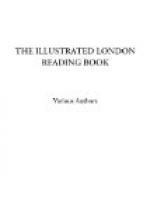I ask’d an aged man,
a man of cares,
Wrinkled and curved, and white
with hoary hairs:
“Time is the warp of
life,” he said; “Oh tell
The young, the fair, the gay,
to weave ’t well!”
I ask’d the ancient,
venerable dead—
Sages who wrote, and warriors
who bled:
From the cold grave a hollow
murmur flow’d—
“Time sow’d the
seed we reap in this abode!”
I ask’d a dying sinner,
ere the tide
Of life had left his veins:
“Time?” he replied,
“I’ve lost it!
Ah, the treasure!” and he died.
I ask’d the golden sun
and silver spheres,
Those bright chronometers
of days and years:
They answer’d:
“Time is but a meteor’s glare,”
And bade me for Eternity prepare.
I ask’d the Seasons,
in their annual round,
Which beautify or desolate
the ground;
And they replied (no oracle
more wise):
“’Tis Folly’s
blank, and Wisdom’s highest prize!”
I ask’d a spirit lost,
but oh! the shriek
That pierced my soul!
I shudder while I speak.
It cried, “A particle!
a speck! a mite
Of endless years—duration
infinite!”
Of things inanimate, my dial
I
Consulted, and it made me
this reply:
“Time is the season
fair of living well—
The path of glory, or the
path of hell.”
I ask’d my Bible, and
methinks it said:
“Time is the present
hour—the past is fled:
Live! live to-day; to-morrow
never yet
On any human being rose or
set.”
I ask’d old Father Time
himself at last,
But in a moment he flew swiftly
past—
His chariot was a cloud, the
viewless wind
His noiseless steeds, which
left no trace behind.
I ask’d the mighty Angel
who shall stand
One foot on sea, and one on
solid land;
“By Heaven!” he
cried, “I swear the mystery’s o’er;
Time was,” he cried,
“but time shall be no more!”
REV. J. MARSDEN.
* * * * *
SIMPLICITY IN WRITING.
[Illustration: Letter F.]
Fine writing, according to Mr. Addison, consists of sentiments which are natural without being obvious. There cannot be a juster and more concise definition of fine writing.
Sentiments which are merely natural affect not the mind with any pleasure, and seem not worthy to engage our attention. The pleasantries of a waterman, the observations of a peasant, the ribaldry of a porter or hackney-coachman; all these are natural and disagreeable. What an insipid comedy should we make of the chit-chit of the tea-table, copied faithfully and at full length! Nothing can please persons of taste but nature drawn with all her graces and ornament—la belle nature; or, if we copy low life, the strokes must be strong and remarkable, and must convey a lively image to the mind. The absurd naivete of Sancho Panza is represented in such inimitable colours by Cervantes, that it entertains as much as the picture of the most magnanimous hero or softest lover.




